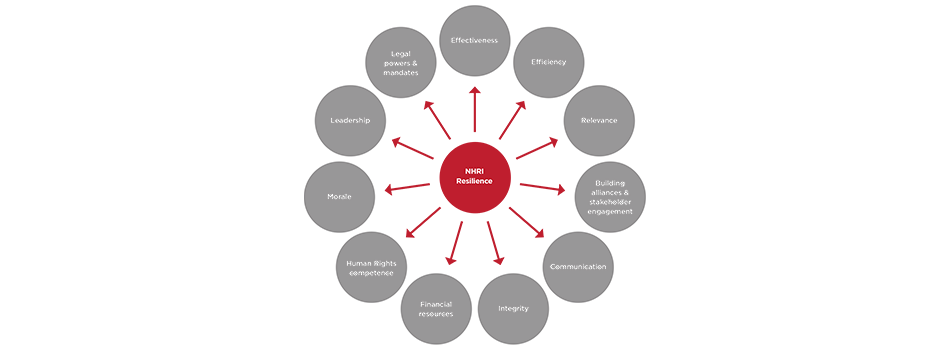Helping human rights champions to change and develop

Figure 1: Factors which contribute to the resilience of NHRIs.
By Professor Julie Hodges, August 2022
.png)
A widely published and leading expert on change in organisations, Professor Julie Hodges was invited to work with the Human Rights Department of the Office for Security and Co-operation in Europe (OSCE).
Along with others I was invited to work with the Human Rights Department on a project aiming to increase effectiveness and strengthen the working environment for human rights defenders in the OSCE region, including National Human Rights Institutions (NHRIs).
The Office for Democratic Institutions and Human Rights (ODIHR) is the principal institution of the OSCE and is responsible for the human dimension. ODIHR is active in the fields of human rights, election observation, democratic governance, tolerance and non-discrimination, and the rule of law. In accordance with the mandate of ODIHR, the Human Rights Department assists OSCE-participating States in fulfilling their obligations to protect and promote human rights and fundamental freedoms in a number of areas. In particular, the Human Rights Education and Capacity Building Programme aims to increase the capacity of government officials to respect, protect and fulfil human rights, as well as strengthen the capacity of civil society actors and national human rights institutions (NHRIs) to monitor, report and promote human rights and fundamental freedoms.
Human Rights Defenders in the OSCE region face challenges in conducting their human rights work safely and securely. NHRIs also face specific threats due to their position in the national human rights infrastructure. Such threats — which include physical attacks or threats, budget cuts, smear campaigns and infringement in selection and appointment procedures of heads of institutions — negatively impact the work of NHRIs, which rely on their independence to carry out their functions effectively in democratic societies. These serious challenges give rise to the need to provide operational guidance on building a long-term resilience of NHRIs.
The project aimed to produce a framework that would provide guidance to NHRIs and assist them in strengthening their independence through building their own resilience. To further this aim, I worked with the ODIHR in conducting research into resilience as it related specifically to the organisation, and then applied the findings to produce a Resilience Framework and Toolkit which focused on the factors outlined in Figure 1.
The development and implementation of organisational resilience practices will help to improve the ability of NHRIs to anticipate, prepare for, respond to, and adapt to changes, threats and sudden disruptions. The framework and toolkit are due to be launched at a conference in Warsaw in September and I have been invited to facilitate a key session at the conference.
More information on Professor Hodges' research interests.

/prod01/channel_3/business/media/durham-university-business-school/impact/Home-Header-or-Footer-(8).png)